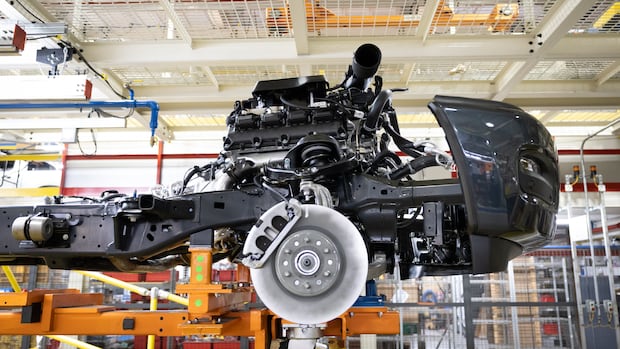Listen to this article
Estimated 5 minutes
The audio version of this article is generated by text-to-speech, a technology based on artificial intelligence.
Stellantis and one of its Canadian auto suppliers are battling in court over the price of brake rotors in a dispute that threatens to shutter multiple auto assembly plants in the U.S.
Peterson Spring says in a court filing it can’t afford to ship the parts to the automaker at a price it claims is below the cost to produce them at its facility in Woodstock, Ont.
Lawyers for Stellantis claim the supplier has threatened to stop shipping parts if the automaker does not pay twice the contracted price, equal to a $77-million US annual increase.
They argue that it’s extortion, and any disruption from their sole supplier for the part would cause “massive and immeasurable” disruption, including idling two Stellantis assembly plants in Michigan.
Stellantis is asking an Ontario court to appoint an independent company to take charge of the Woodstock operation and order the continued shipment of parts.
Stellantis writes in court filings that it’s attempting to find alternative options, but replacing the supplier requires new parts passing safety tests in a process that could take two years.
Canada’s Automotive Parts Manufacturers’ Association (APMA) says the case demonstrates the fragile nature of the automotive supply chain.
“When [U.S. President] Donald Trump says, ‘I want to have everything sourced in the U.S.’ and his administration thinks it can happen overnight,” said APMA president Flavio Volpe, “here’s a world-leading automaker saying that for a very simple part, a rotor, it would be minimum 24 months.”
Parts company founder faces fraud lawsuit
Court documents reviewed by CBC News detail a complicated sale of the Woodstock operation that involves companies owned by a billionaire businessman who is now being sued on allegations of fraud.
Patrick James is the founder of First Brands Group, an American-based after-market parts company overseeing dozens of popular brands.
He resigned in October as CEO after the company entered bankruptcy proceedings in September.
First Brands Group is now accusing him of stealing billions of dollars from the company, which James denies.
The Woodstock facility was bought by a subsidiary of First Brands Group this summer, but the deal fell through.
That’s when Peterson Spring, also owned by James but not a subsidiary of First Brands Group, purchased the facility instead.
In the court documents, Peterson Spring says the transaction included Stellantis purchase orders for brake rotors, which the company found out weeks ago are purchased at or below cost.
“I determined that the historical selling prices for the products sold to Stellantis are uneconomical for a company, such as Peterson, that does not have a diverse product portfolio,” writes Timothy Soergel, general manager of Peterson Spring.
Soergel states the previous owner of the facility, ZF, was able to subsidize selling below-cost brake rotors because of higher profits in other parts of its business.
Concerns over possible shutdown of 2 plants
In late October, the two companies started to negotiate a new price for the rotors, according to Soergel.
Stellantis was asked to pay twice the previously agreed price negotiated with ZF backdated to July and Peterson Spring told the automaker it would stop shipping parts if they didn’t agree, according to Stellantis lawyers.
“The threatened stop in shipment of the parts by Peterson Spring will result in the imminent shutdown of operations at two of Stellantis’s assembly plants,” lawyer Lisa Corne wrote in an urgent court filing made on Oct. 27.
Those plants are in Sterling Heights and Warren, the Michigan cities where Stellantis makes the Dodge Ram and Jeep Grand Wagoneer.
“A shutdown of the production lines at Stellantis plants will substantially and immeasurably damage Stellantis’s relationship with current and future customers,” wrote Corne, “and its goodwill and reputation in the automotive industry in general.”
The next day, Oct. 28, both sides entered a temporary agreement between Peterson Spring and Stellantis to keep parts flowing.
Stellantis is paying a $7.2-million lump sum in addition to the historical price for parts to ensure shipments continue until Nov. 17.
Lawyers from both sides declined to comment on the case, as did a spokesperson for Stellantis.
A representative for Peterson Spring could not be reached.
Volpe, who has been an outspoken critic of the trade war impacting the automotive industry, said this case proves how complex and connected the supply chain is.
“We always say that if you cut off parts, you’re gonna shut down the industry. We said that when Donald Trump, at the beginning of the year, said he was gonna tear up everything, including parts,” said Volpe.
“If the Canadian parts sector didn’t get an exemption on tariffs from the White House in March, we would have shut down the industry.”







